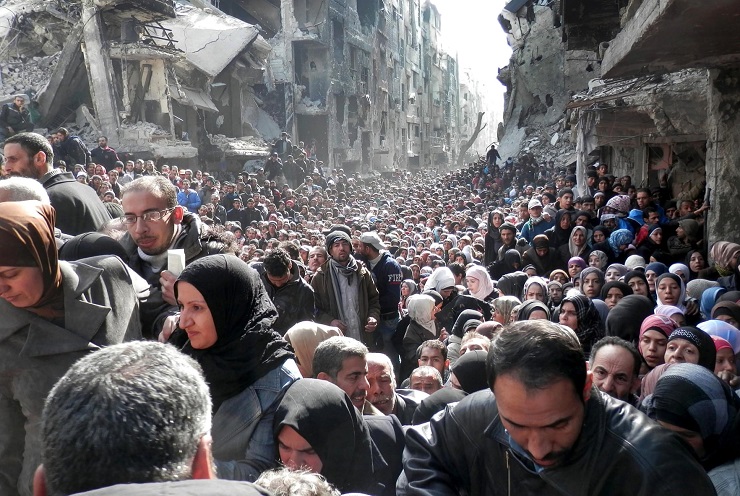The so-called US “Civilian Protection Act” does everything except “protect” the people of Syria. If anything, it aims, what a draconian law would normally do, to further destroy and strangulate the Syrian economy to make the country’s post-war economic reconstruction and development even more difficult. As the act’s “statement of policy” states in explicit terms, the US continues to seek a “regime change” in Syria. Indeed, the cardinal US purpose behind igniting a “civil war” in Syria was always to “send Assad home”, but the combined military strategy of Syria, Iran and Russia turned out to be the key to defeating the CIA–sponsored militant groups. The US, as it stands, continues to pursue the same objective, although its military defeat in Syria has forced it to shift its focus from direct military intervention and support for militant groups to economic sanctions.
While this is not for the first-time that sanctions have been imposed on Syria, the fact that this “protection act” expands the US reach to even non-Syrians i.e., Syrian’s “foreign friends” (Russia, China, Iran) makes it an even worst attack on Syrian economy. This is in turn part of an officially declared US strategy to make Syria a “quagmire for Russia.”
The aim is two-fold: to restrict the ability of Syria’s foreign friends to freely pour money into Syria’s reconstruction economy, and to exacerbate even further the already extremely poor conditions. With famine already knocking on the doors of Syria, fresh US sanctions will only deteriorate the economic conditions, which have already forced about 83 percent of Syrians to live below the poverty line.
The Syrian pound, which held steady at around 500 to the US dollar for several years, went into free fall last year, hitting a low of 3,000 in June, in anticipation of fresh sanctions. That currency drop is hindering Assad’s plans for buying up all of this year’s wheat to make up for a shortfall in imports that is drawing down on strategic reserves.
What, according to the UN itself, Syria needs is “immediate and substantial injection of funds, life-saving provisions of food, water, health care”, what, however, it gets from the West is extensive sanctions and, what Mike Pompeo called, continued US “stabilisation activities in northeast Syria” where most of Syria’s oil wells are located. Whereas the oil could prove crucial for Syria’s economic recovery, this is obviously not what the US wants to see happening in Syria. Accordingly, an “oil disaster” under the US auspicious is already looming large in northeast Syria.
At the same time, where the US is warning of an imminent crisis, the “Protection Act” aims to make sure that the Syrians get nothing. The act says the US president will impose sanctions on a “foreign person” if they undertake actions that include knowingly “sell[ing] or provid[ing] significant goods, services, technology, information or other support that significantly facilitates the maintenance or expansion of the Government of Syria’s domestic production of natural gas, petroleum or petroleum products.”
The act goes on to further explain that part of this US “strategy” is to “deter foreign persons from entering into contracts related to reconstruction in the areas” under the direct control of the Syrian government or its supporters from Russia and Iran. The self-explaining act makes it clear that its clauses are a deliberate attempt to ensure that Syria, devasted by a war that the US and its allies engineered and imposed in 2011, is not rebuilt, and that Syrians have to live amid ruin.
This, the US hopes, may force the Syrians to rise up against their government eroding its legitimacy. But it is highly unlikely to produce the desired results; for, as it stands, sanctions without a clear policy objective are nothing more than making a political point at the expense of the most vulnerable i.e., common people of Syria. Therefore, if the underlying reasons for the Syrian people’s poor conditions are US sanctions, as even the Red Crescent said in its recent report, the Syrian people are unlikely to mobilise against the government, which has been resilient enough to bring political stability to a large part of Syria, on a large scale.
That this is unlikely to happen is indeed one principal reason why the US has decided to impose sanctions on Syria to mainly wrest Assad’s and those of its allies’ ability to stabilise the country. Therefore, while the US sanctions have never worked to bring, as in case of Iran and Venezuela, “regime change”, they are most likely to create a humanitarian crisis and make reconstruction efforts difficult. The “protection act” is, therefore, not anti-regime; it is mainly anti-people and anti-development. It aims to spread chaos and erode political and economic stability efforts of the government. On the other hand, if the act “protects” anything, it is the US interests.
Salman Rafi Sheikh, research-analyst of International Relations and Pakistan’s foreign and domestic affairs, exclusively for the online magazine “New Eastern Outlook”

